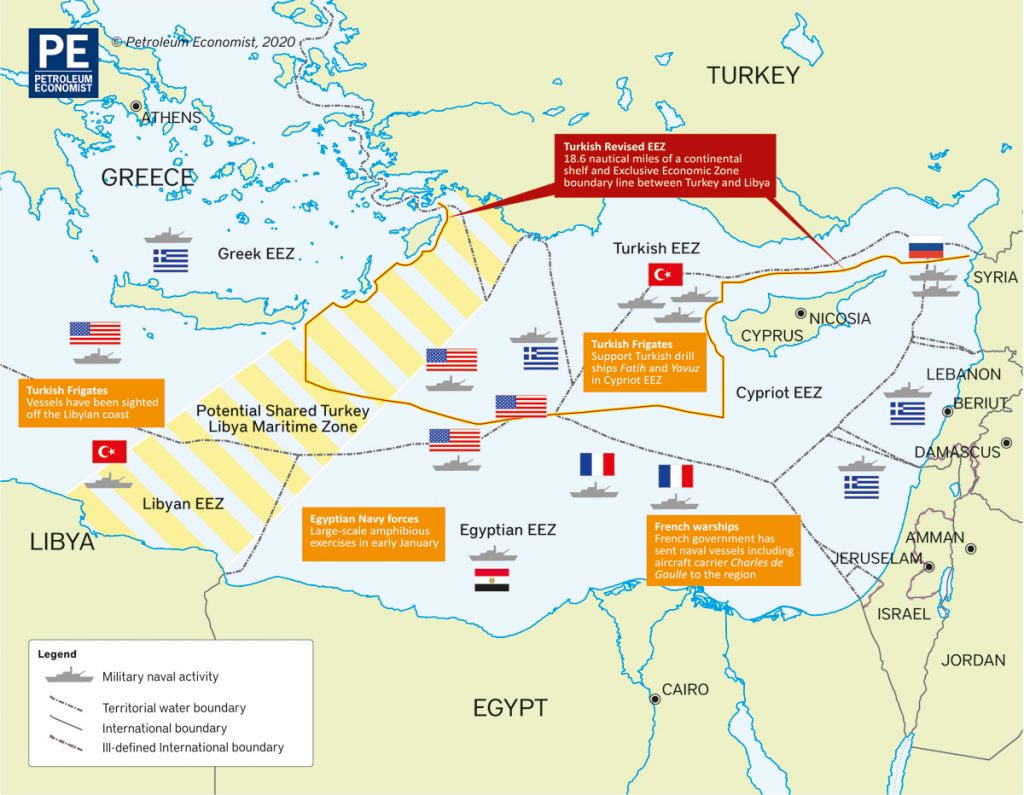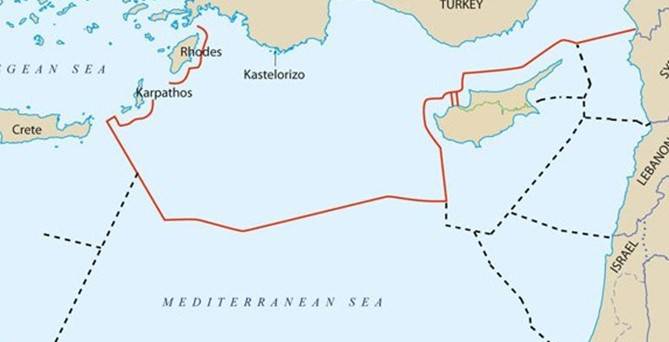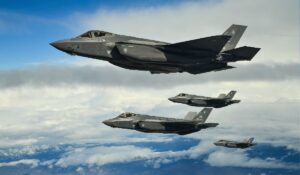A large mass of western imperialist states’ air and naval forces is gathered in Eastern Mediterranean. This “competitive co-existence” of large war ships with huge firepower that sail permanently in the area can be seen in map 1.

The main factor is the presence of the American Navy, operating from the large naval base of Suda in the island of Crete. The latter is considered to be of crucial strategic importance for the US, as a main pillar in the “arc of containment” that ranges from Poland to Israel.
Recently, the Greek Parliament approved a new military agreement between Greece and USA, which makes the presence of American military bases in Greece permanent, upgrading the alliance between the two states to a “strategic partnership.” This agreement was saluted by Mike Pompeo and celebrated by all Greek political parties—except for the radical Left, that protested in the streets against the deal.
The agreement was systematically prepared by the SYRIZA government under Alexis Tsipras and it was then finally signed by the New Democracy government under Kyriakos Mitsotakis. The US ambassador in Athens, Geoffrey Payatt (an “overactive” diplomat who worked in Ukraine in the past…), chose to pay tribute to the pioneering role of Alexis Tsipras in this shameful agreement, provoking bitter comments from right-wing politicians. Inside the country, in addition to the Suda base which is becoming larger and larger, the US now has large and modern military airfields (like the NATO HQ in Larisa), transport-and-supply bases for “rapid intervention” forces and stationary bases for modern “strategic weapons” (probably including the so-called “small” nuclear weapons…a veil of extreme secrecy covered this latter issue in the parliamentary debate). They also employ the port of Alexandroupoli (in northern Greece) which will serve as an LNG (Liquefied natural gas) handling station and as a militarized naval station.
At the same time, the French State, led by Emmanuel Macron, established a permanent naval base in Cyprus and the French carrier “Charles De Gaul” is permanently patrolling in the seas around Cyprus.
In early February, in the small island of Skyros in central Aegean, a joint military drill was conducted with the participation of Greek, American and French forces. The drill simulated an operation to recapture the island, against an imagined scenario in which it was invaded earlier.
The message was clear and the next day it became explicit by Mike Pompeo: a potential military attack on Greek positions will receive a “euro-atlantic” response, which is symbolized by the activity of American and French armed forces in the area.
This alliance also has important local forces on the ground. Over the last years, Greek diplomacy has played an active leading role in the establishment of two supplementary “axes.” These are the notorious “triads” between Greece-Cyprus-Israel and Greece-Cyprus-Egypt. The states that comprise these “triads” are co-operating closely, they form a common position regarding the sharing of Exclusive Economic Zones (EEZ) in Eastern Mediterranean and they openly declare (with systematic joint military exercises among others…) that they have the military strength to impose their preferred sharing arrangement in the area.
Greece is a country where traditionally the solidarity to the Palestinian cause was big. Today, that the State of Israel is pushing for the “final solution” in Palestine, it is shocking that you can barely find a single negative comment in the Mass Media about the Israeli policies. The diplomacy of the “axis” was proven more powerful than the obligation to stand with the Palestinians. This is true both for the older social-democracy of PASOK and for the new social-democracy of Alexis Tsipras.
Two factors form the basis for these developments:
a) The rifts in the relationship between the Erdogan regime in Turkey and the USA and the western camp in general. These came into the open after the failed coup attempt in 2016, which Erdogan (rightfully) considered as “American-led.” The tensions pre-existed (eg Turkey didn’t allow the US to use the large Incirlik Air Base freely, like the Greek State did with Suda…) but they became larger when the Turkish government started to work with the Russians in Syria and reached a climax when Turkey obtained Russian S-400 missiles.
This rift cannot be underestimated: it already produces political results in Syria, Libya and Eastern Mediterranean. But it should not be seen as definitive. While the American Congress declared the purchase of S-400 missiles a major insult to the US (thus a point of formal rupture in relationships), the actual policy of Donald Trump always leaves room for a potential smoothing of the relationship with Turkey. After all, this is a country whose geographical place and huge population make it a valuable asset for NATO. In addition, the regime of Tayip Erdogan might have survived 3 failed coup attempts, but it is becoming weaker inside the country, because of popular resentment (mostly opposition to extremely authoritarian governmental practices) and the financial troubles of the Turkish economy.
b) The realignment of diplomatic relations in the area—with the deterioration of American-Turkish and Israeli-Turkish relationships and the consequent upgrade of American-Greek and Israeli-Greek military and economic relationships—took off when the geopolitics of hydrocarbons came into play.
Big deposits of natural gas have been found in the area, inside the Israeli and the Egyptian EEZ’s. It is assumed (since research is still at the preliminary stage) that deposits also exist inside the EEZ of Cuprus, in the areas south of Crete and in the seas between Greece and Italy to the west. With the exception of western areas (where Italian ENI is engaged, with its own strategies and alliances), the “gas fields” in the south-eastern Mediterranean have been conceded to a consortium of the major western multinational mining companies, led by the American Exxon Mobil and the French Total. The assignment includes research, utilization, extraction, transport and trade of the fossil fuels (mostly natural gas and possibly oil) that might be found.
These companies, in cooperation with Israel, Egypt, Cyprus and Greece, have concluded to the plan of the East Med pipeline. It is a pharaonic project: It provides the construction of a submarine pipeline of huge length, which shall connect Israel with Italian shores, bypassing Turkey while stretching to a territory full of very deep seas and with high seismicity. The cost of such a mega-project is unknown, its technical problems are unprecedented and the commercial profitability is doubtful. As a result, many “experts,” including some executives of the mining industries, are very cautious.
But these problems—that may prove to be the determining factor at the end of the day—are for now repelled in public discussion, which is focused entirely on “geopolitics”: In order to construct the East Med without the participation of Turkey, it must be secured that the EEZ’s of Israel, Cyprus and Greece are connected geographically. This geographical connection would serve for a pipeline that shall unite Israel with European shores, passing exclusively by sea territories that fall under the sovereignty of the states which are part of the plan. This sharing agreement of sovereignty over sea territories, which was concluded by the local “players” and supported by USA and the EU (France playing a leading role) can be seen in map 2.

What is left for Turkey can be seen in map 3, which shows how highly impossible it is to impose such a “sharing” in a peaceful way.

Despite all that, the East Med plan was officially signed by the governments of Greece, Cyprus and Israel last month. While recently, the American Congress voted for the East Med Act, which declares this plan to be the official energy policy of the US in Eastern Mediterranean.
International Law
This plan was advanced through the tactics of creating accomplished events, and it was constantly justified by invoking International Law and its provisions on issues of sovereignty in the seas. But the plot thickened. The government of Erdogan, in order to break its isolation, moved to the delimitation of EEZ’s between Turkey and Libya—at the least the part of Libya that is controlled by the “government” of Fayez al-Sarraj (which is nonetheless recognized by western governments). This delimitation creates a “wedge” of waters under Turkish sovereignty (see map 4) which interrupts the continuity between the EEZ’s of Cyprus and Greece, thus rendering East Med an unreachable dream.

This delimitation agreement will probably prove to be abortive, like the Libyan “government” that co-signed it (Athens is already supporting “general” Khalifa Haftar in Libya…). But in the meantime, Turkey applied to the United Nations to register the maritime agreement signed with Libya, thus challenging anyone who disputes it (mostly Greece and Cyprus) to resort to International Law and specifically to the International Court of Justice in Hague.
This development provoked a crucial strategic debate inside the Greek ruling class and the state bureaucracy.
There is a “wise and cautious” current, which includes some social-democrats (like ex-prime minister Kostas Simitis an ex-PASOK leader Evagelos Venizelos), some right-wing politicians (like Dora Bakoyianni and others) and some diplomats and “negotiators” of the Greek State. They seem to realize that any actual prospect of exploiting hydrocarbons in Eastern Mediterranean can be realized only through a process of “common understanding” with Turkey. Thus, they support appealing to the International Court of Justice.
But another part of the establishment insists on taking advantage of the alliance with USA and France and exploiting the current conjuncture of Turkey’s isolation, in order to pursue a “winner-takes-all” confrontation. They keep the possibility of a military skirmish on the table, hoping that it will be easily contained and it won’t escalate to an all-out Greco-Turkish war.
Unfortunately things are even more complicated than this disagreement. The International Court of Justice can be convened after the states that appeal to it agree on the issues that the relevant Court’s decisions will be considered as binding for both parties.
The Greek State recognizes the Court’s jurisdiction only on the issue of maritime boundaries and consequently the delimitation of EEZ. It categorically refuses any discussion on issues that relate to the expansion of Greek sovereignty which has already been imposed unilaterally. These include: the militarization of the islands of eastern Aegean (in violation of the Treaty of Lausanne, signed by Greece and Turkey in 1923 to “regulate” sovereignty disputes in the Aegean Sea), the expansion of Greek sovereignty in a large number of uninhabited islets and rocks in the Aegean, and mostly the unilateral expansion of Greek air space to 10 nautical miles, beyond the 6 miles of Greek territorial waters.
On the other hand, Turkish diplomacy has no intention to facilitate Greek claims, so it puts on the negotiating table all the unresolved disputes of sovereignty between the two states, including all the aforementioned issues.
The competition around the EEZ’s and hydrocarbons is expanding towards all the issues of sovereignty in the Aegean, which have been proven to be extremely dangerous in the history of the two countries. We shall recall that the current “balance” between the two states is the product of 5 (!) wars during the 20th century. So, the tendency to “revise” the current settlement is very strong in both countries.
Extractivism and militarism
The amplification of the extractivist strategy is literally absurd in the conditions of economic and social crisis in both countries and facing the threat of the global climate crisis and environmental disaster.
Right now, a huge part of Greek territory is disposed as a “field” to mining companies, in search of natural gas and oil. This expensive (and destructive) project will probably bear fruit at a time when Europe will be less “thirsty” for gas than it is today and when interest for oil will be limited, as an otherwise experienced supporter of extractivism wrote. But under anarchic and voracious capitalism, decisions are based on the current criteria and competitions. A typical example is the biggest contemporary investment of the Greek Public Electricity Company, which is directed on a huge lignite mine in Western Macedonia. The mine is planned to start production sometime during 2020, while the Greek state has signed the…prohibition of lignite usage—gradually from 2023 and the ban will be full by 2025.
Unfortunately, the extractivist strategy in the seas, intertwined with issues of state sovereignty on them, is directly linked with an enhancement of militarism.
The “axis” strategy in the Eastern Mediterranean, led the Greek state to year after year dispose over 2% of its GDP in military expenditures for NATO, becoming the steadiest buyer of weapons in the euroatlantic alliance. Despite the economic crisis, Greece (both under Tsipras and under Mitsotakis) is modernizing its naval and air forces, aiming to retain the technological military advantage. The government has already submitted a “Memorandum of Interest” to buy over-expensive state-of-art American F-35 airplanes (only Israel has those in the area) and it had submitted an order for the construction of French Belhara type frigates. Even hawkish military websites, “connected” with the military command, describe such weapons as suited only for “wars of aggression”…
The policy of armaments is connected with the political reinforcement of militarism. In the mainstream media, there is a daily parade of retired military officers and hawkish analysts who try to ignite a climate of patriotic fervor and familiarize the people to the prospect of a war. During the parliamentary debate on the State annual budget, SYRIZA voted in favor or the military expenditures of Mitsotskis, defending this sordid position by invoking the need for “national unity in addressing the threats that the country is facing.” Here is another aspect of Alexis Tsipras’ “Greek 1914.”
The radical Left in Greece is fully aware of the brutal and oppressive nature of the Erdogan regime. After all, solidarity to Turkish political refugees, Kurdish exiles and fugitives and Syrian refugees were tasks that were supported by the radical Left forces constantly. But we are obliged to place our hopes in struggling against this regime to the social movements and the Left who are active in Turkey.
Here in Greece we have other tasks: the confrontation with Greek nationalism, the opposition to pro-war policies “at home,” resistance to armaments, militarism and collaboration with imperialist powers “in our country,” the denunciation of extractivism as an absurd and dangerous strategy.
Eastern Mediterranean has become yet again a “powder keg.” Any war crime here, can have negative and unforeseen consequences in Europe and the world.
Antonis Davanellos is a leading member of DEA (Workers' Left) in Greece.





